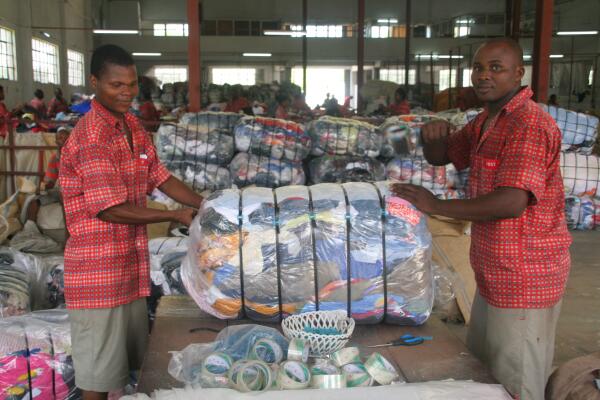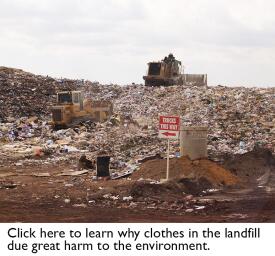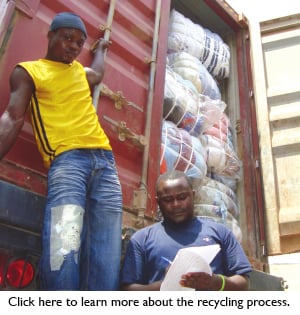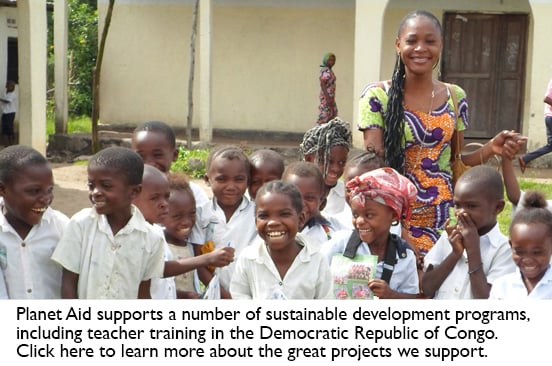Why Sell Used Clothing?

If people are giving away their old clothes for free in donation bins, why should companies earn money from them? There are a couple of reasons why almost all clothes-collecting organizations, even charitable one like Planet Aid, end up selling the clothing.
We can't donate all of it here.
 Americans generate around 16 million tons of textile waste each year. There are plenty of people in the United States who need clothing donations, but there is way more supply than there is demand. That's not to say we completely ignore domestic causes. Planet Aid does gives away clothing to local needy people, including the homeless, newly-arrived refugees, and victims of sexual assault, but realistically it'd be impossible to redistribute all the clothing we collect within the U.S.
Americans generate around 16 million tons of textile waste each year. There are plenty of people in the United States who need clothing donations, but there is way more supply than there is demand. That's not to say we completely ignore domestic causes. Planet Aid does gives away clothing to local needy people, including the homeless, newly-arrived refugees, and victims of sexual assault, but realistically it'd be impossible to redistribute all the clothing we collect within the U.S.
In short, you don't have many options when you're ready to part with your clothes-- you can throw them straight into the trash where they decompose in a landfill and release harmful greenhouse gases, or donate them to a clothes-collecting organization. Virtually any organization you choose to donate to will sell the clothing, most are just less transparent about that fact.
We use it to cover the cost of collections.
 Most municipalities do not have curbside recycling programs for textiles. That means for most people in the U.S., keeping clothes out of the trash is up to private organizations like Planet Aid, and it's not cheap! We have to spend more than $26 million out of our budget to recycle the 100 million pounds of clothing we receive from bins in 23 states. The recycling process includes expenses for bins, trucks, warehouse space, clothes processing equipment, and all of the salaries for our drivers, warehouse workers, and managers. The money needed to sustain this operation needs to come from somewhere, and the obvious answer is that it can come from the clothes themselves.
Most municipalities do not have curbside recycling programs for textiles. That means for most people in the U.S., keeping clothes out of the trash is up to private organizations like Planet Aid, and it's not cheap! We have to spend more than $26 million out of our budget to recycle the 100 million pounds of clothing we receive from bins in 23 states. The recycling process includes expenses for bins, trucks, warehouse space, clothes processing equipment, and all of the salaries for our drivers, warehouse workers, and managers. The money needed to sustain this operation needs to come from somewhere, and the obvious answer is that it can come from the clothes themselves.
We can help meet the demand for used clothing overseas.
What is "fashionable" is incredibly subjective and often depends on a region's own cultural preferences. You may donate items from your closet because they are no longer on trend here, but they might be highly sought after in another country. Clothing that is unlikely to be sold in an American thrift store is actually in demand in the developing world, and it makes sense that these garments end up overseas. So why not just donate the clothes directly to these people who want them? Dropping off used clothing, or any other type of aid handout for that matter, is not considered a sustainable solution to poverty (we address this in another blog post, "5 Myths About Used Clothing"). Selling clothes to buyers, who can them resell them in local markets, is an exchange that benefits all involved.
We use the money to make the world better.
There are a lot of clothes-recycling organizations out there who keep the proceeds from selling their clothes, and they have every right to do so. But we at Planet Aid know that money can make a big difference in the lives of those less fortunate. The donations we received are helping the poor find and grasp opportunities that lead to lasting improvements and a better quality of life. In 2013 alone, we donated more than $12 million to projects in Africa, Asia and Latin America.
Our goal is to work for the environment, and for people, and we have remained true to our nonprofit ideals as we support sustainable development and protect our Earth. Thanks to your support, we can continue collecting, redistributing, recycling, and yes, selling your clothes to make a positive impact all over the world.
